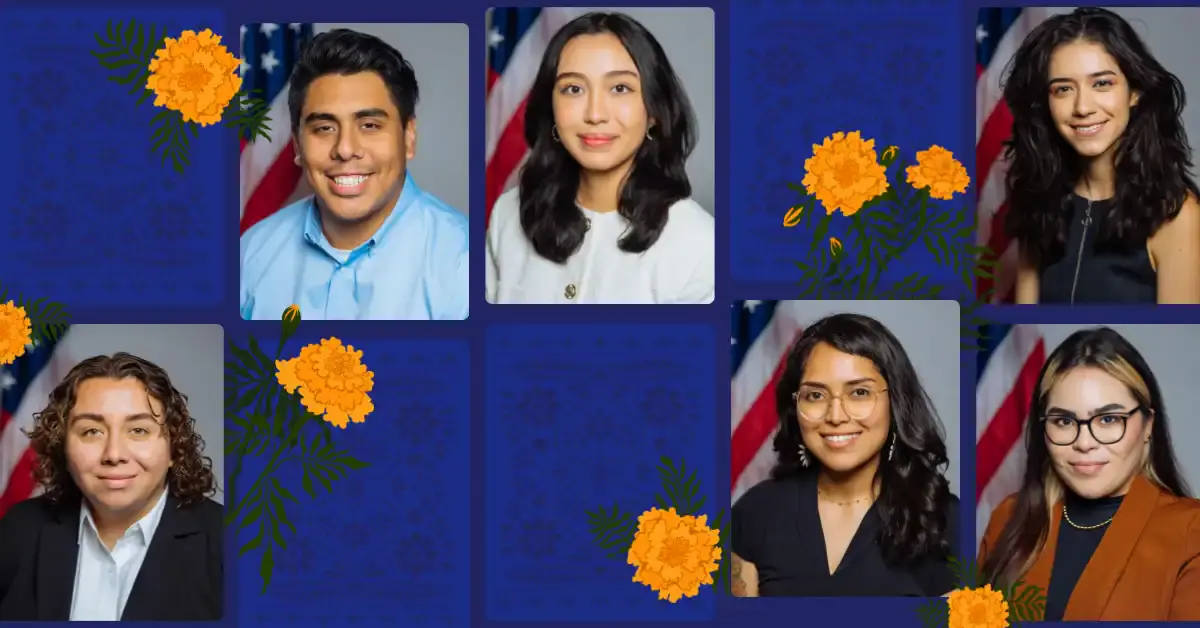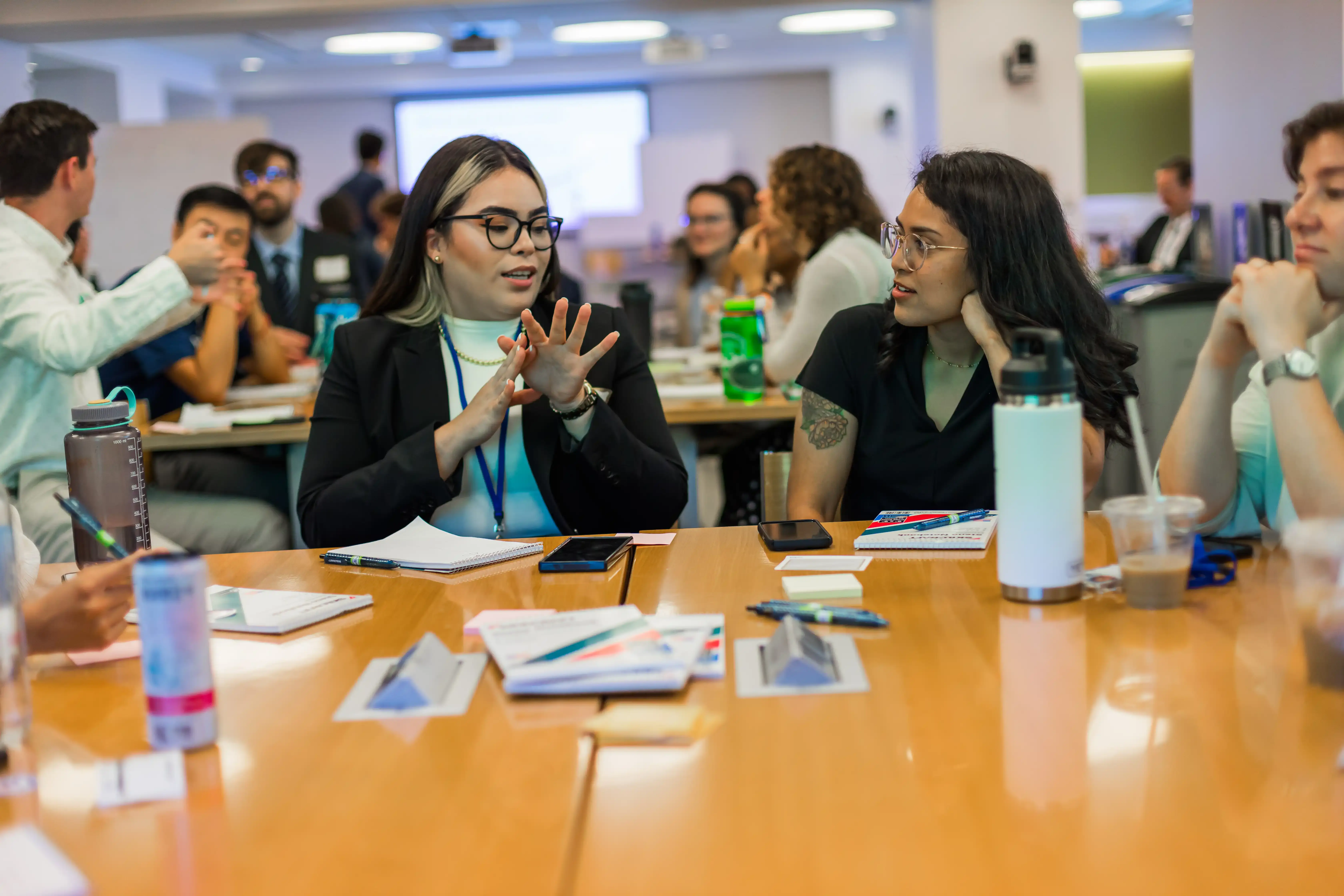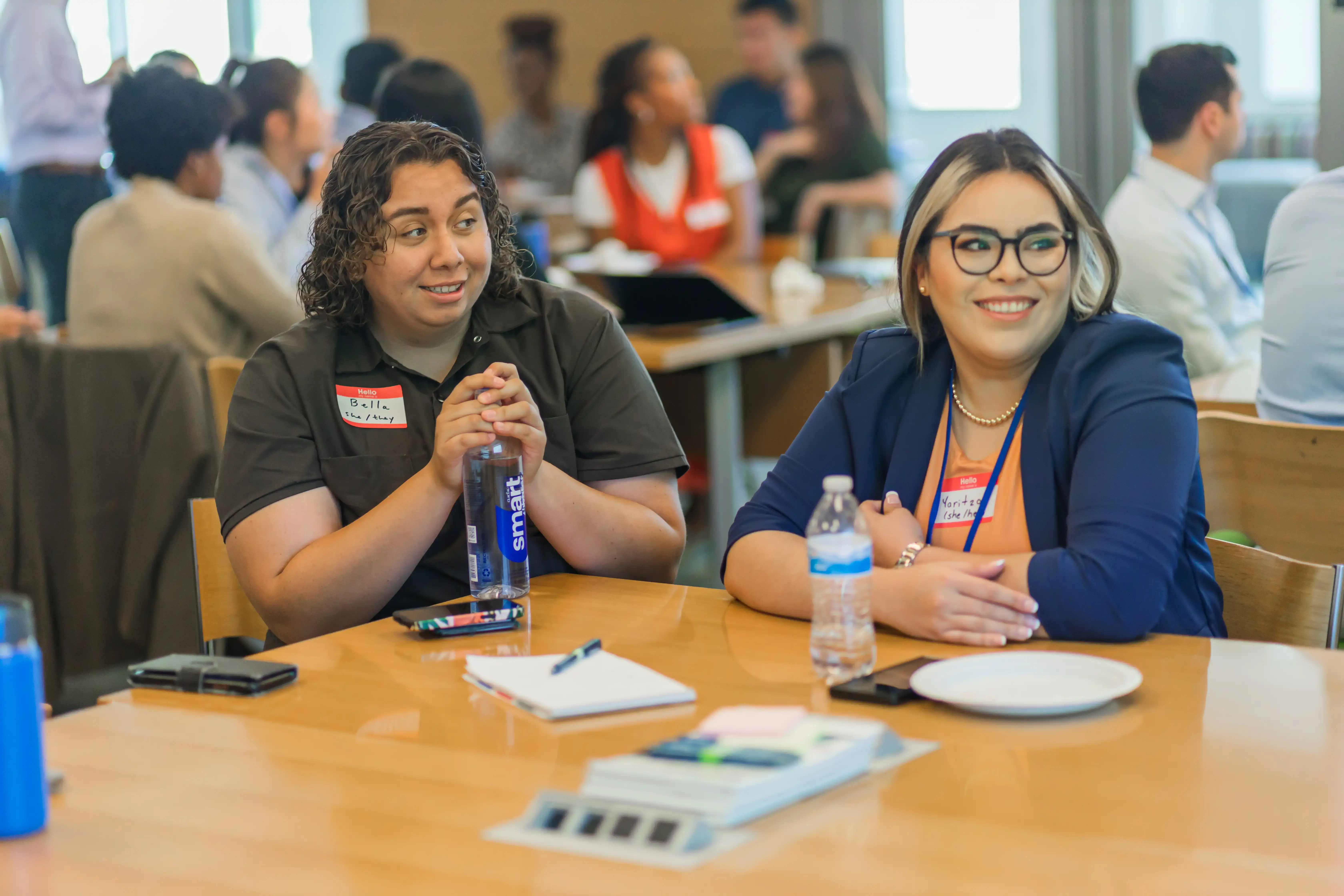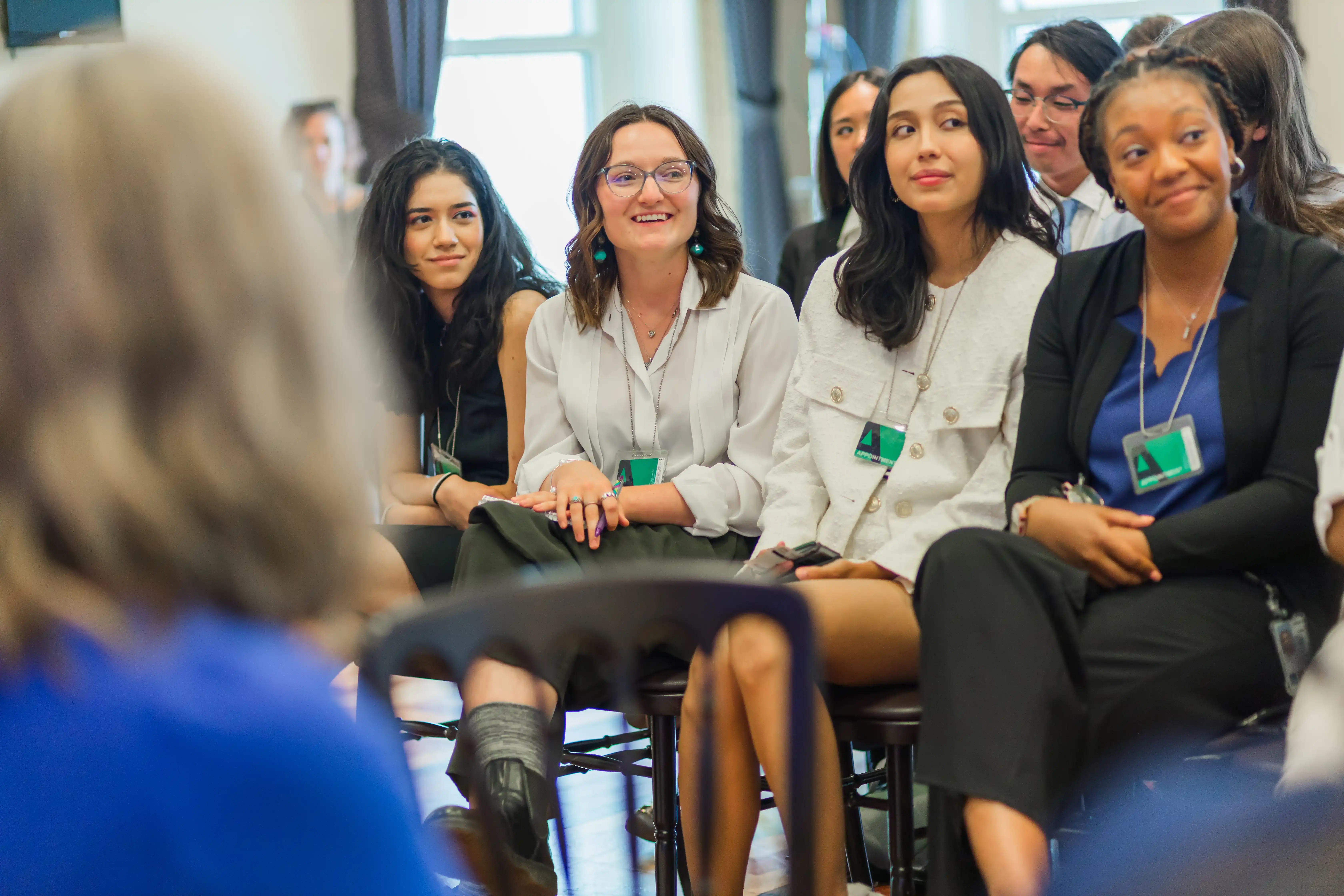This National Hispanic Heritage Month, we asked several of our Fellows to reflect and share how they bring their Latinx/Hispanic heritage and identities to their work as civic technologists across the federal government. This year’s Hispanic Heritage Month theme is “Todos Somos, Somos Uno – We Are All, We Are One,” which celebrates the diverse voices and points of view within the Hispanic community. The U.S. Digital Corps (USDC) is proud to have Fellows who represent the diversity of the American public that we serve, and we are also proud that our Fellows support work that serves the Hispanic community through programs such as USAGov en Español.

Melissa Guzman
How do you identify?
I identify as Mexican-American.
How do you show up as Latinx? Why is that important to you?
This is a very important topic for me! In workplaces, there can sometimes be a culture of “white professionalism” where the way people are expected to conduct themselves can erase the specific cultures and identities that make us unique individuals. I rebel against this standard by standing firmly in my roots which means wearing my Mexican Huichol jewelry, not masking my accent, and otherwise showing up as my whole self. When we mask our identities, we can’t be our authentic selves. We can’t make the genuine connections we want and need to thrive.
What drove you to join the U.S. Digital Corps and work in public service?
I joined the U.S. Digital Corps because I believe that it is a great opportunity to learn how tech is used by the U.S. government to implement policies to serve the public. This is a unique place where I can make a tangible impact on the care that my father, and millions of others, receive as a Medicare enrollees, which is something I care deeply about compared to building something like a next-gen movie recommendation system. No shade though!
Can you tell us a bit about the project you are currently working on? What is the impact you hope to have for the public?
I’m working as a software engineer at the Centers for Medicare and Medicaid Services within the Office of Enterprise Data and Analytics (OEDA). Specifically, I’m working within the Data Analytics & Strategy Group (DASG) which builds customer-focused, standards-based products that enable access to health data for Medicare enrollees, providers, and healthcare partners to improve healthcare delivery and care coordination. I hope my contributions will lend a hand in transforming U.S. healthcare.
What does celebrating diversity mean to you?
Celebrating diversity to me means acknowledging our differences, being open to learning more about our differences, and appreciating those differences. When you engage in learning about a different culture, you are affirming the identity of your co-workers, your student peers, and others around you. In turn, doing so facilitates a space in which people feel they can be their authentic selves which is vital to a thriving, collaborative environment. Celebrating diversity means respect. It means uplifting the voices of people of different identities. They are the ones who share their experiences, identities, and cultures. You do not assume or tell their stories. Instead, you make space to listen and learn from what they share.

Vivian Vasquez
How do you identify?
I identify as Mexican-American. I’m a proud Chicana from Los Angeles, California.
How do you show up as Latinx? Why is that important to you?
Showing up as Latinx to me means building community whenever possible, whether it be attending Latinx in tech affinity spaces when I can, patronizing Latinx owned businesses, bantering in Spanish with my Latinx friends who are also trying to improve their Spanish, or simply making time to visit my family. Showing up as a Latina in every space I inhabit is important to me because I firmly believe that when we show up as our truest selves, it’s much easier to find common ground with others and to generate trust with one another.
What drove you to join the U.S. Digital Corps and work in public service?
Growing up, I heard countless stories of the hardship my mother faced as a young Latina woman struggling to assert her independence in the United States that I firmly believe could have been alleviated by more agile and technologically efficient public services. At the same time, my mother always instilled within me a steadfast belief that America is a land of untapped potential and it was my job to build those opportunities for future generations, which is what I hope to accomplish as a U.S. Digital Corps Fellow. Whether it be through making healthcare services more accessible to low-income Americans or encouraging future early-career Latinx people to apply and bring their perspective to the U.S. Digital Corps or public service more broadly, I’m ecstatic to contribute to a civic tech movement that is increasingly inviting to Latinx folks.
Can you tell us a bit about the project you are currently working on? What is the impact you hope to have for the public?
I’m working as a data scientist for the Centers for Medicare and Medicaid Services within the Office for Enterprise Data and Analytics (OEDA). Specifically, I’m working within the Information Products and Analytics Group (IPAG), which aims to advance health equity by addressing the health disparities that underlie our health system and to increase access to quality, affordable health coverage.
What were some hesitancies you had before considering a role in the federal government?
My main hesitancy was being unsure if the federal government was a place where I could show up as my full self to work. Being a lesbian and a Latina, I often fear that being casually open about my identities will seem unprofessional, even if mentioned in passing. However, working in the federal government these last few months, I’ve felt nothing but unwavering support from my coworkers and managers. Everyone is concerned first and foremost with providing the most efficient and equitable services to our constituents, irrespective of, but also attending to the diverse needs of the American public in such a way that I know that my identities will never be anything I feel compelled to shy away from mentioning.
What does celebrating diversity mean to you?
Celebrating diversity to me is synonymous with gratitude. Celebrating diversity means that when someone brings an unfamiliar perspective to the table, we welcome it with open arms because it provides us with an opportunity to expand our mindset and consider the world as much more textured than we had previously imagined. Diversity should not be considered a problem to tackle, a quota to meet, or a barrier to overcome. Instead, diversity should be understood as a way to more accurately understand the world that we live in. During Hispanic Heritage Month, I’m reminded to not only cherish the perspective I bring as a Mexican-American, but also to feel thankful whenever I get the chance to hear the perspective of a Latinx person with a vastly different life experience than me, whether that be because we differ in ethnic background, socioeconomic circumstances, or age.
Yaritza M. García Chaparro

How do you identify?
I identify as a proud Puerto Rican/Puertorriqueña/Boricua woman, born and raised on the island. I grew up celebrating holidays like Christmas, Three Kings Day and eating traditional dishes like arroz con gandules, pernil and pasteles.
How do you show up as Latinx? Why is that important to you?
As a Latina, I love being able to share my Puerto Rican culture with others. I’ll often talk about what life on the island is like and about our food, traditions, and values. I also love connecting with people and learning about their culture. This is super important to me since it not only allows me to provide better service to people, but also serves as a voice for those who feel their voice is not being heard.
What drove you to join the U.S. Digital Corps and work in public service?
I’m driven by empathy and a desire to help others. Whenever I hear someone’s story, I think about what they must feel. This motivates me to look for ways to help those around me. The U.S. Digital Corps presented a chance to make a difference through civic service. The fact that my work directly impacts people’s lives motivates me to get up every day knowing that the hours I spend working are not a waste of time, but an investment.
Can you tell us a bit about the project you are currently working on? What is the impact you hope to have for the public?
I currently work as a software developer on the USAGov WebOps team. USAGov’s main purpose is to facilitate the search for information related to government services, as well as provide information that is accessible and easy to understand for both English and Spanish speakers.
What were some hesitancies you had before considering a role in the federal government?
Although I loved the idea of serving the public, I’m not going to deny that one of my biggest fears was wondering “Will I be able to fit in?” However, my teammates have been amazing. As a Puerto Rican, I know my life experiences and culture have led me to have a different perspective. Since I started working at my agency, I have shared my perspective and culture with my coworkers. That has not only helped us strengthen our relationship, but also allows us to provide better service on both our usa.gov website and usa.gov en español.
What is your proudest moment so far in government?
My proudest moment so far has been being able to be the first Puerto Rican at USDC and at USAGov WebOps. Having faced a lack of representation growing up, it feels rewarding to open doors for others like me.
What does celebrating diversity mean to you?
For me, diversity means fully accepting people for who they are. Diversity is being able to arrive at a place and know that no matter what, you are equally accepted and loved. There is nothing more beautiful in this life than being able to share experiences with the people around you knowing that you will not be judged or criticized for it.
Eduardo Perez
How do you identify?
I identify as Mexican American. As the son of two immigrants, I was fortunate enough to not carry their burden and pain of leaving home. I am very proud of my parents and like many children of immigrants I will forever be indebted to them for their sacrifices.
How do you show up as Latinx? Why is that important for you?
I show up as Latinx by expressing my perspective and views on life. Being Latino is much more than an identity but a way of living. It’s carrying the traditions of your parents and recognizing how being yourself is an addition to the Latino culture even if at times it conflicts with the past and present.
What drove you to join the U.S. Digital Corps and work in the public service?
What drove me to the U.S. Digital Corps is my commitment to public service. Having the opportunity to support communities from all walks of life is something I have always strived towards.
Can you tell us a bit about the project you are currently working on? What is the impact you hope to have for the public?
I am a product manager at the Office on Trafficking in Persons (OTIP) at the Administration for Children and Families. OTIP maintains a case management system (CMS) to track individuals who have experienced trafficking and ensure they receive the services, support, and benefits they are entitled to. My role is to ensure that the CMS remains operable and in good standing with all our partners.
What were some hesitancies you had before considering a role in the federal government?
Unfortunately, when you begin to move up the professional ladder, there are fewer and fewer Latinos and you realize that you can feel detached from what makes you you. I didn’t want this to stop me and I know that simply being in government is not enough! We must speak up and be willing to be placed in uncomfortable situations to enact change.
What is your proudest moment so far in government?
My proudest moment so far in government has been supporting my team and being someone they can rely on.
What does celebrating diversity mean to you?
Celebrating diversity to me is having the opportunity to talk, laugh, and engage with people from different races, cultures, religions, and creeds.
Bella Mendoza
How do you identify?
I identify as Mexican-Ecuadorian-American. My family is from Guayaquil, Ecuador; Chihuahua, Mexico; and Jalisco, Mexico.
How do you show up as Latinx? Why is that important to you?
My voyage through the tech field has been sprinkled with moments of realizing that seeing a lack of people who reflect my identities has affected me more than I ever thought it would. Carrying my Latinx identity with me in all of the spaces I am in is very important to me, because I hope that by doing so, people will look out and notice that we are present in and do belong in these spaces.
Occupying space in the data science world as a Mexican-Ecuadorian-American is particularly meaningful to me because the beauty of data is found in the diversity and stories of the people it represents. Being able to interact with data as a person from a colorful Latinx background brings me joy.
Lastly, I am also a coding instructor. I’ve been teaching children how to code for over five years now, and I see this as an opportunity to show up as Latinx and show the future generation that we are in these spaces and our identities bring perspective.
What drove you to join the U.S. Digital Corps and work in public service?
One trait that I’ve proudly inherited from my Latinx family is that we like to take care of people. Joining the U.S. Digital Corps and working in public service allows me to apply my technical skills in a way that keeps the people we serve in the spotlight.
Can you tell us a bit about the project you are currently working on? What is the impact you hope to have for the public?
I work for the tech team at the White House Office of Science and Technology Policy. A major component of our work is to leverage data to advance equity.
What is your proudest moment so far in government?
I was given the opportunity to help organize a convening of federal women data leaders. One of my proudest moments in government so far was looking out into that room and feeling empowered by all of the diverse voices present.
What does celebrating diversity mean to you?
To me, celebrating diversity means cherishing the color that people’s experiences give to the world. Like a big hug, celebrating diversity is about embracing each other’s stories and holding them close.
Lylybell Teran

How do you identify?
As an Ecuadorian-American born in New York, my identity is deeply rooted in both my cultural heritage and my American upbringing. I embrace my Ecuadorian heritage with pride, celebrating our traditions, language, and values.
How do you show up as Latinx? Why is that important to you?
I show up as a member of the Latinx community by actively participating in outreach programs throughout my academic years and I continue to do so. Currently, I volunteer at a federally-funded nonprofit to translate data science resources into Spanish for outreach purposes. It’s important to me to represent and support my community in this way because I’ve found myself as the only Hispanic woman in the field of data science during my previous government work experiences. Translating resources allows for a broader understanding for Spanish speakers who are looking for free and accessible data science resources online. My goal is to reach fellow community members who may be interested in breaking into the field.
What drove you to join the U.S. Digital Corps and work in public service?
My passion for advocating for my community through technology drove me to join the U.S. Digital Corps and work in public service. I want to use tech-driven solutions to address the needs of the Latinx community in government and I believe that diversity and representation in these fields are crucial for creating inclusive policies and programs.
By working in public service, I aim to leverage my skills in data science and technology to advocate for initiatives that address these disparities and promote equitable opportunities for all. My personal experiences of being the only Hispanic woman in many machine learning and artificial intelligence (AI) environments have fueled my determination to be a trailblazer for others who aspire to make a difference in the field. I firmly believe that diverse voices and perspectives are essential in shaping the future of technology and government, and I want to be part of that transformation.
Can you tell us a bit about the project you are currently working on? What is the impact you hope to have for the public?
I am currently immersed in a project at the National AI Institute within the Department of Veterans Affairs that combines computer vision and natural language processing to automate the early detection of critical diseases. Our project’s primary aim is to revolutionize healthcare for veterans by providing a powerful tool for identifying harmful diseases at their earliest stages.
My passion for working for the public and underrepresented people in society is at the core of this project’s mission. By developing AI algorithms, we not only aim to enhance the efficiency of disease detection but also increase accessibility to quality healthcare. Our work has the potential to break down barriers that underserved communities often face when it comes to timely and accurate medical diagnosis. Through this project, I aspire to help improve healthcare outcomes for veterans and, by extension, for all individuals who may have limited access to healthcare resources.
U.S. Digital Corps Fellows work on high-impact projects across government. Applications for our 2024 Fellow cohort will open this fall. Subscribe to our newsletter and follow us on Twitter and LinkedIn to stay updated on upcoming events and opportunities to apply.


